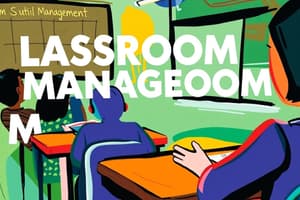Podcast
Questions and Answers
Disruptive behaviors can lead to missed key concepts in learning.
Disruptive behaviors can lead to missed key concepts in learning.
True (A)
Implementing classroom consequences has no effect on managing disruptive behavior.
Implementing classroom consequences has no effect on managing disruptive behavior.
False (B)
Creating a safe classroom environment helps in effective learning.
Creating a safe classroom environment helps in effective learning.
True (A)
Engaging methods like games and activities can increase classroom disruptions.
Engaging methods like games and activities can increase classroom disruptions.
Regularly checking in with students about their feelings can help maintain a positive learning environment.
Regularly checking in with students about their feelings can help maintain a positive learning environment.
Mindfulness practices in the classroom have no effect on student behavior.
Mindfulness practices in the classroom have no effect on student behavior.
Encouraging respectful interactions is unimportant in a learning environment.
Encouraging respectful interactions is unimportant in a learning environment.
Disruptive behavior can lead to calls or emails home to parents.
Disruptive behavior can lead to calls or emails home to parents.
Active participation is not considered essential for engaging in ASL classroom activities.
Active participation is not considered essential for engaging in ASL classroom activities.
Strategies to manage disruptive behavior are important for maintaining a positive learning environment.
Strategies to manage disruptive behavior are important for maintaining a positive learning environment.
Disruptive behavior has no impact on the overall learning experience in an ASL classroom.
Disruptive behavior has no impact on the overall learning experience in an ASL classroom.
Using appropriate sign language is one of the classroom rules to follow in ASL settings.
Using appropriate sign language is one of the classroom rules to follow in ASL settings.
A classroom rule that promotes respect among students includes being prepared for each class.
A classroom rule that promotes respect among students includes being prepared for each class.
Ignoring personal space while signing is encouraged in an ASL classroom to foster interaction.
Ignoring personal space while signing is encouraged in an ASL classroom to foster interaction.
Listening attentively and responding appropriately are part of effective communication in ASL.
Listening attentively and responding appropriately are part of effective communication in ASL.
Students must raise their hands before speaking in an ASL classroom to ensure organized communication.
Students must raise their hands before speaking in an ASL classroom to ensure organized communication.
Active participation only involves listening to others in class discussions.
Active participation only involves listening to others in class discussions.
Encouraging students to hold one another accountable can foster a sense of responsibility.
Encouraging students to hold one another accountable can foster a sense of responsibility.
Inclusive classroom activities guarantee that every student participates in some way.
Inclusive classroom activities guarantee that every student participates in some way.
Disruptive behavior does not impact the learning experiences of other students.
Disruptive behavior does not impact the learning experiences of other students.
Using a buddy system for constructive feedback can help improve classroom engagement.
Using a buddy system for constructive feedback can help improve classroom engagement.
Examples of disruptive behavior include being inattentive and using laptops during class.
Examples of disruptive behavior include being inattentive and using laptops during class.
Active engagement does not contribute to the retention of information.
Active engagement does not contribute to the retention of information.
Role-plays are considered an inclusive activity in the classroom.
Role-plays are considered an inclusive activity in the classroom.
Study Notes
Consequences of Disruptive Behavior
- Disruptive behavior negatively impacts learning for both individuals and the class overall.
- Disruptive behavior can cause missed key concepts and damaged relationships among peers.
- Disruptive behavior results in lost instructional time and the need for students to catch up on missed material.
Addressing Disruptive Behavior
- Addressing disruptive behavior promptly and fairly is crucial to maintaining respect and authority in the classroom.
- A consequence system, such as a first warning followed by a discussion with the student, helps encourage better choices.
- Consistent disruptive behavior may lead to contact with parents and may be referred to behavior specialists with documentation included.
Strategies: Managing Disruptive Behavior Successfully
- Establish clear classroom rules and consistently enforce consequences.
- Strategies such as mindfulness and short breaks may help students refocus and correct disruptive behavior.
- Engage students with games and interactive activities to minimize disruptions and keep them interested and involved.
- Create an atmosphere of mutual respect to encourage accountability and positive learning experiences.
Creating a Positive Learning Environment in ASL
- A safe classroom environment is essential for effective learning.
- Students should feel comfortable expressing themselves without fear of judgment.
- Regularly check in with students to address any concerns about their comfort level in the classroom.
Encouraging Respectful Interactions
- Respectful interactions help maintain a positive learning environment.
- Active participation, engaging in class activities, and utilizing ASL are critical for classroom success.
Active Participation
- Active participation involves student involvement in discussions and activities, including asking questions, sharing thoughts, and engaging in group tasks.
- Active participation enhances information retention and confidence in using ASL.
- Engaging activities like practicing signing together helps improve signing skills and ASL conversational abilities.
Accountability in Participation
- Students should be held accountable for their participation to foster a sense of responsibility.
- Implementing a buddy system with partners providing feedback can motivate students to engage respectfully.
Inclusivity in Activities
- Activities should be inclusive, ensuring every student has an opportunity to participate.
- Utilize varied formats like pair work, role-plays, and group discussions cater to diverse learning styles and encourage widespread involvement.
Types of Disruptive Behaviors
- Disruptive behaviors include talking over others, using Chromebooks during class, and inattentiveness.
- Other disruptive behaviors include swearing, refusing to follow directions, arguing, mistreating others, making distracting noises, mocking others, and disrupting the learning process.
Introduction to ASL Classroom Rules & Expectations
- Establish clear rules and expectations for a productive learning environment in the ASL classroom.
- These rules ensure all students feel safe, respected, and able to participate fully.
- Communicate these expectations on the first day of class to set up accountability and demonstrate respect.
Classroom Rules Refresher
- Respect Everyone's Space: Maintain appropriate personal boundaries.
- Raise Your Hand to Speak: Use appropriate classroom etiquette.
- Use Appropriate Sign Language: Practice proper signing and use appropriate language.
- Stay Engaged and Participate: Actively participate in class activities and discussions.
- No Distracting Others During Class: Avoid behaviors that disrupt learning for others.
- Be Prepared for Each Class: Bring necessary materials and be ready to learn.
- Ask Questions as Needed: Clarify anything you don't understand.
- Be Supportive of Classmates: Support and encourage your peers.
Importance of Respect & Communication in ASL
- Respect is crucial in ASL classrooms as it encourages open exchange of ideas.
- Respect each other's communication styles, backgrounds, and experiences.
- Effective communication is vital for successful ASL learning.
- Engage in both verbal and nonverbal interactions to express yourself clearly.
- Listen attentively and respond appropriately to strengthen relationships and communication.
What's in the Presentation
- ASL Classroom Rules & Expectations: Establishes clear rules and expectations for the class.
- Importance of Respect & Communication: Highlights the importance of respect and effective communication in the ASL classroom.
- Active Participation: Encourages students to actively engage in class.
- Consequences: Explains the consequences of disruptive behavior.
- Strategies: Offers strategies for managing disruptive behavior.
- Positive Learning Environment: Focuses on creating a safe and respectful learning environment.
- Classmates Support & Collaboration: Emphasizes the importance of classmate support and collaboration.
Studying That Suits You
Use AI to generate personalized quizzes and flashcards to suit your learning preferences.
Related Documents
Description
This quiz covers the consequences of disruptive behavior in educational settings, including its impact on learning and relationships. It also explores strategies for addressing and managing such behavior effectively, emphasizing the importance of clear rules and communication with students and parents.



